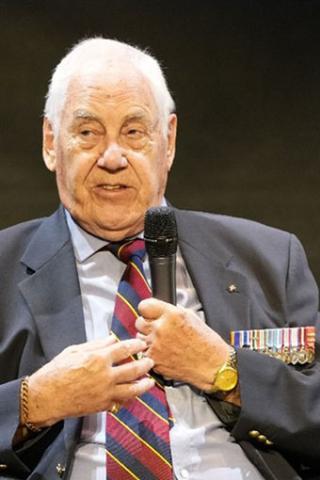
Joined
1958
Postings
- USATCA Fort Knox Kentucky
Liaison Officer, 1971-1974 - National Defence College
Colonel, 1978-1980 - National Defence Headquarters
Director of Armour, 1980-1983 - 1 Canadian Mechanized Brigade Group
Commander, 1984-1987 - Army Staff College
Commandant, 1987-1989 - The Royal Canadian Dragoons
Colonel of the Regiment, 1993-1998 - The Royal Canadian Armoured Corps
Colonel Commandant, 2000-2023
Deployments
- Cyprus – 1964-1965
- Germany – 4 Canadian Mechanized Brigade Group (NATO) – 1965-1967
- Israel and Syria – UNTSO and UNDOF – 1975-1976
- Germany – 4 Canadian Mechanized Brigade Group (NATO) Commanding Officer, The Royal Canadian Dragoons – 1976-1978
- Cyprus – UNFICYP Force Commander – 1989-1992
Major-General (Retired) Clive Milner was born in the city of Derby, United Kingdom, in 1936. He lost his father at the end of the Second World War and his mother gave him the best upbringing she could. As a child, Milner supported his local soccer club, Derby County, and even saw them win the FA Cup at Wembley Stadium. The self-described “farm boy from England,” later graduated from agricultural college and moved to Canada in search of work.
While working on several farms in Alberta, Milner soon realized it would be a while before he could have a farm of his own, and a fateful visit to downtown Calgary led him to that idyllic poster with the enticing message: “You too can fly a plane!”
“They told me it was tanks and heavy machinery, which kind of suited me, having been working on the farms.”
It wasn’t long before Milner arrived in Borden for his first taste of military life. “We were marched off carrying our suitcases,” he recalls. “It was a bit of a shock. I took it as a challenge and I thought, if other people have done it then I can do this too.”
Following basic training, Milner entered the armoured corp. “They told me it was tanks and heavy machinery, which kind of suited me, having been working on the farms.”
Soon after, Milner volunteered to serve for his first time with the United Nations Emergency Force in Egypt. “I was looking for adventure,” he says.
Meanwhile, tensions were mounting on the nearby island of Cyprus. On August 16, 1960, Cyprus became an independent republic. Yet, the political landscape remained complex, with unresolved tensions between Greek Cypriots and Turkish Cypriots regarding governance and representation. These disputes intensified, and by December 1963, violence erupted as clashes broke out, leading to widespread unrest across the island.
“The UN was asked to send a peacekeeping force until the issues were sorted out,” says Milner. “So, it was in ’64 that I first went to Cyprus.” On March 4 of that year, the UN set up the United Nations Peacekeeping Force in Cyprus (UNFICYP) to help restore order.

Clive Milner (third from the left) with some of the first UNFICYP troops to arrive in Nicosia, Cyprus, in 1964.
“I was in the reconnaissance squadron, which had a number of tasks. We planned routes, we investigated situations that were likely to be problems. We would spend a week at camp to maintain vehicles, study, take up post at the operations centre.”
Time away from camp could be three to four weeks at a time, explains Milner. “When you’re outside [the camp] you’re out with your vehicle traveling from town to town, looking into areas where weapons might be hidden. Something untoward might be happening. Always alert, always vigilant.”
“Canadians have been appreciated in Cyprus throughout their time there.”
As tensions grew on the island, there were rumours that tanks were being landed in the port of Famagusta, which roused concern with the Turkish community, the government, and the United Nations.
Milner and his team were tasked with confirming the intelligence. “We were told to stay with the tanks to make sure we knew exactly where they were and report on them.” He says.

UNFICYP soldiers near an observation post in Cyprus.
“There were about 40 of them which was a considerable amount of armour for a small island like Cyprus, so we watched them like a hawk and we watched them training and preparing. And we were still doing that when my first six-month tour ended and we came back to Canada.”
The Canadian presence in Cyprus has held on for 60 years, and in Milner’s words “Canadians have been appreciated in Cyprus throughout their time there.” While he admits that there was suspicion and apprehension among the locals in the early days of the mission, he notes that “the Cypriots have always accepted the need for their presence. They admit it would have been worse without them.”

UNFICYP Force Commander Clive Milner.
In 1989, after many postings, including a number of visits to Cyprus, Milner was selected to be the Force Commander of UNFICYP. He commanded the force for three years and retired after that. But he wasn’t done yet. Milner continued working for another 10 years with the UN, which included time in Haiti and in South Africa.
In retirement, he continues to engage with fellow soldiers that he has met along the way, and will travel back to Cyprus in November 2024 on a commemorative pilgrimage with other Veterans of the Cyprus mission. As ever, Milner makes sure to pay his respects during the two minutes of silence every November 11.
“It’s an emotional time,” reflects Milner. “My thoughts go to my family members who have served, those who were killed in the war, and have died since then. It’s a flashback to the memories that I’ve acquired over all these years of service.”
Video: Clive Milner
The well-being of Veterans is at the heart of everything we do. As part of this, we recognize, honour and commemorate the service of all Veterans. Learn more about the services and benefits that are available to Veterans and their families.